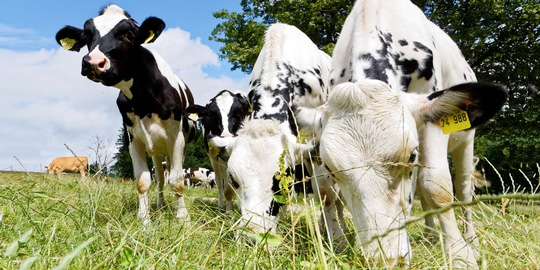Opportunity for targeted animal welfare promotion

The ongoing reforms of animal welfare policy in the European Union (EU) offer great opportunities for the targeted promotion of farms - but for this to happen, animal welfare data must be linked to agricultural, trade and nutrition policy: This is the conclusion reached by researchers at the University of Hohenheim in Stuttgart. Prof. Dr. Christine Wieck and research associate Sara Dusel see progress in animal welfare in agriculture since the introduction of EU-wide regulations. However, they also complain about significant gaps in knowledge. From their point of view, closing these and creating financial incentives for a change in agriculture is necessary in order to achieve a higher level of animal welfare in Europe.
With the farm-to-fork strategy, the EU has laid down cornerstones for a sustainable transformation of the European agricultural and food system. One of several declared goals is to improve animal health and animal welfare in agriculture - through reforms in husbandry, transport and slaughtering through to marketing and consumption.
The European Commission is currently revising the regulations for animal welfare in agriculture. The so-called "fitness check" was recently completed. It serves to check the effects of the existing animal welfare regulations and to improve them if necessary. Prof. Dr. Wieck from the Department of Agricultural and Food Policy at the University of Hohenheim and the research assistant Sara Dusel. Their expertise helps to find promising options for action and to assess the effects of planned measures.
Significant knowledge gaps
According to the researchers, the existing regulations have brought advances in animal welfare in agriculture. However, differences in application and enforcement continue to hamper the internal market and the achievement of a comparable level of animal welfare in the EU.
In addition, there are significant knowledge gaps: "There is a lack of information about the conditions under which the animals are kept, transported and slaughtered in the individual member states," regrets Prof. Dr. wieck “In addition, the existing regulations focus on resources, such as space and management measures. The well-being of the animals is still too little recorded on the animals themselves. Even if the existing EU rules were fully implemented, they could probably only ensure that certain basic requirements for animal welfare are met. Animal welfare is not sufficiently determined based on the condition of the animals.”
In order to nevertheless provide information for the fitness check, the advantages and risks of different husbandry systems were derived from the scientific literature and expert knowledge was consulted. "This enabled a rough estimate of the impact of EU regulations on animals, farms and other stakeholders," explains Sara Dusel.
Create financial incentives and strengthen existing initiatives
In the opinion of the two scientists, the nationwide conversion of agriculture to substantially higher animal welfare standards will not work through the market alone, which underlines the need for public measures to improve animal welfare. “A crucial point is the financial incentive. But there is currently no comprehensive financing strategy at EU level that links agricultural, trade and food policy, systematically links payments to progress in animal welfare and thus ensures targeted financial support for the transition to higher animal welfare standards," says Prof. Dr. wieck
In addition to the common agricultural policy, the researchers believe that there are already promising initiatives that can advance animal welfare at EU level and should therefore be strengthened. These include the planned EU animal welfare label, possible EU animal welfare monitoring and the inclusion of equivalent animal welfare standards in EU trade agreements so that EU standards are not undermined by cheaper imports.
